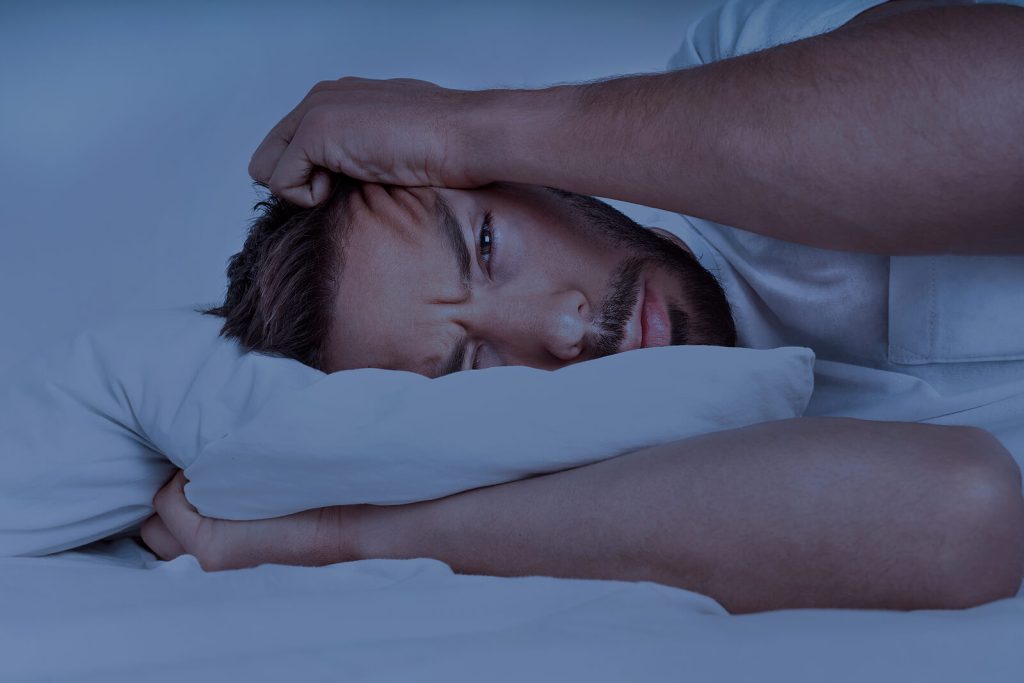You may have wondered at some point in your life, how mental health and insomnia might be connected. The truth is, the relationship between insomnia and mental health is multifaceted and complex. Perhaps, you have noticed when you are experiencing insomnia, your mental health is adversely affected. On the flip side, when your mental health is not optimal, it can lead to insomnia. So, let’s explore these two issues further and look at the ways in which mental health and insomnia are connected.
How Does Your Mental Health Affect Your Ability to Sleep?
When you are experiencing mental health concerns such as depression, anxiety, or chronic stress, sleep may be more difficult to achieve. Whether that’s falling asleep or staying asleep. This is because your nervous system is heightened due to these feelings of worry and fear. It makes your brain more alert and ready to respond, preventing you from getting the rest your body needs.
For example, if you are feeling emotionally drained and overwhelmed, your cortisol levels may be higher which can also prevent you from getting enough rest. In addition, mental health issues such as depression can lead to changes in your sleep patterns and make you more prone to nightmares. This means, it will be difficult to fall asleep, or you may wake up in the middle of the night and not be able to get back to sleep. If this becomes a regular occurrence, this can have a negative impact on your mental health.
How Does Insomnia Affect Your Mental Health?
Insomnia is the inability to sleep normally, as well as difficulty staying asleep. When you do not get enough rest, it can take a toll on your mental health. Firstly, if you are not sleeping well, you may feel more exhausted and irritable during the day. This can make it more difficult to focus on tasks and make decisions, which can lead to frustration and stress.
If you are already struggling with a mental health struggle such as depression, this lack of sleep can make it worse. Studies have found that insomnia is associated with higher levels of depression and anxiety. Anxiety and depression often cause you to overthink and ruminate, which can lead to more insomnia. However, it can create a cycle where the lack of sleep can further worsen your mental health symptoms.
The Relationship Between Mental Health and Insomnia
It is clear that mental health issues can contribute to insomnia, as well as the reverse. This means if you are struggling with mental health, it is important to address your sleep. Treatment for insomnia can vary but may include making lifestyle changes such as avoiding caffeine, limiting naps during the day, and creating a peaceful sleep environment.
For example, it is recommended that you avoid television and bright lights from phones and tablets before bed. Furthermore, talking to a mental health professional can be beneficial to both your sleep and mental health. A Clinician at Agave Psychiatry can provide you with the skills and tools to cope with stress and anxiety, which may help you sleep better. They may recommend techniques such as cognitive behavioral therapy and mindfulness to help you relax during the day and a medication option at night to help with sleep.
Closing Thoughts from an Arizona Psychiatrist
Overall, it is important to be mindful of the relationship between mental health and insomnia. By recognizing the connection, you can take steps to help improve both your sleep and mental health. You will want to have strategies in place to address any mental health struggles, as well as make changes to your lifestyle in order to promote better sleep. With the right help, you can get back on track to feeling better both physically and mentally.
Interested in Insomnia Treatment in Arizona?
Sleep is an essential part of your well-being and mental health. Therefore, it is important to take steps to address any issues that may be causing insomnia. Whether it is environmental, psychological, or lifestyle factors, our team at Agave Psychiatry is committed to helping you get the rest you need. Follow the steps below to get started on your journey to healing.
- Get to know our skilled team of Clinicians here.
- Fill out our convenient online mental health contact form here.
- Begin finding solutions to your insomnia with Agave Psychiatry!
Other Online Mental Health Services offered at Agave Psychiatry
In addition to Insomnia Treatment, we also offer a wide variety of other mental health services. These include treatment for Nutritional Psychiatry, Depression, ADHD, Insomnia, PTSD, Eating Disorders, outpatient substance abuse treatment, and Anxiety. In fact, we offer online treatment for both adults and children, and adolescents in the state of Arizona.






